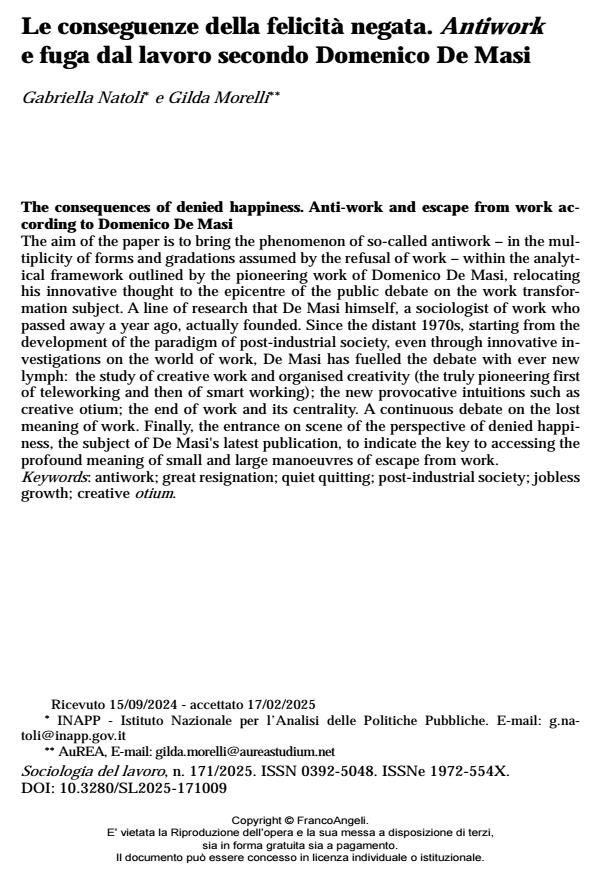Le conseguenze della felicità negata. Antiwork e fuga dal lavoro secondo Domenico De Masi
Titolo Rivista SOCIOLOGIA DEL LAVORO
Autori/Curatori Gabriella Natoli , Gilda Morelli
Anno di pubblicazione 2025 Fascicolo 2025/171
Lingua Italiano Numero pagine 19 P. 186-204 Dimensione file 143 KB
DOI 10.3280/SL2025-171009
Il DOI è il codice a barre della proprietà intellettuale: per saperne di più
clicca qui
Qui sotto puoi vedere in anteprima la prima pagina di questo articolo.
Se questo articolo ti interessa, lo puoi acquistare (e scaricare in formato pdf) seguendo le facili indicazioni per acquistare il download credit. Acquista Download Credits per scaricare questo Articolo in formato PDF

FrancoAngeli è membro della Publishers International Linking Association, Inc (PILA)associazione indipendente e non profit per facilitare (attraverso i servizi tecnologici implementati da CrossRef.org) l’accesso degli studiosi ai contenuti digitali nelle pubblicazioni professionali e scientifiche
Obiettivo del paper è quello di ricondurre il fenomeno del cosiddetto antiwork – nella molteplicità di forme e gradazioni assunte dal rifiuto del lavoro – entro la cornice analitica delineata dall’opera precorritrice di Domenico De Masi, ricollocando il suo pensiero innovatore all’epicentro del dibattito pubblico in tema di trasformazione del lavoro. Filone di ricerca che lo stesso De Masi, sociologo del lavoro scomparso un anno fa, ha di fatto fondato. Sin dai lontani anni ’70, a partire dalla messa a punto del paradigma della società post industriale, attraverso indagini innovative attente ad aspetti inediti del mondo del lavoro, De Masi ha alimentato il dibattito di linfa sempre nuova – lo studio del lavoro creativo e della creatività organizzata, quello, davvero antesignano, del telelavoro e poi dello smart working – e di nuove provocatorie intuizioni – l’ozio creativo, la fine del lavoro e della sua centralità – e di continue sollecitazioni sul senso perduto del lavoro. E, infine, l’entrata in scena della prospettiva della felicità negata, oggetto dell’ultima pubblicazione demasiana, per indicare la chiave di accesso al significato profondo delle piccole e grandi manovre di fuga dal lavoro.
Parole chiave:antiwork; grandi dimissioni; dimissioni silenziose; società post-industriale; sviluppo senza lavoro; ozio creativo.
Gabriella Natoli , Gilda Morelli, Le conseguenze della felicità negata. Antiwork e fuga dal lavoro secondo Domenico De Masi in "SOCIOLOGIA DEL LAVORO " 171/2025, pp 186-204, DOI: 10.3280/SL2025-171009